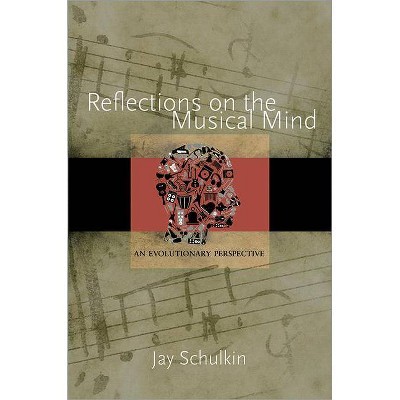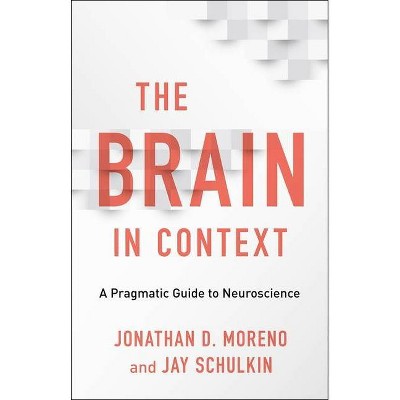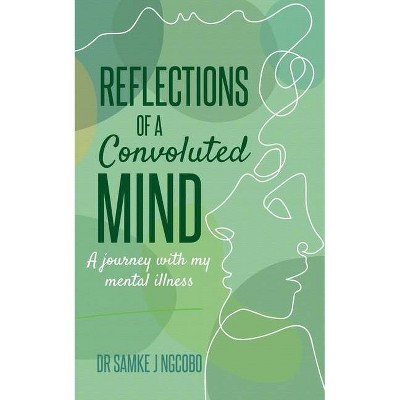Reflections on the Musical Mind - by Jay Schulkin (Hardcover)

Similar Products
Products of same category from the store
Product info
<p/><br></br><p><b> Book Synopsis </b></p></br></br><p>What's so special about music? We experience it internally, yet at the same time it is highly social. Music engages our cognitive/affective and sensory systems. We use music to communicate with one another--and even with other species--the things that we cannot express through language. Music is both ancient and ever evolving. Without music, our world is missing something essential. <p/>In <i>Reflections on the Musical Mind</i>, Jay Schulkin offers a social and behavioral neuroscientific explanation of why music matters. His aim is not to provide a grand, unifying theory. Instead, the book guides the reader through the relevant scientific evidence that links neuroscience, music, and meaning. Schulkin considers how music evolved in humans and birds, how music is experienced in relation to aesthetics and mathematics, the role of memory in musical expression, the role of music in child and social development, and the embodied experience of music through dance. He concludes with reflections on music and well-being. <i>Reflections on the Musical Mind</i> is a unique and valuable tour through the current research on the neuroscience of music.</p><p/><br></br><p><b> From the Back Cover </b></p></br></br><p>"The many aspects of music--its social, emotional, cognitive, somatic, and evaluative components--all have their analogs in activities of the human brain. So it makes sense for a neuroscientist, especially one well versed in music, to explain these connections. By taking an evolutionary perspective and asking the difficult why questions--Why do we have music? Why might it be beneficial for society? Why is music linked with dancing? Why do we respond emotionally to music?--Schulkin engages his reader in issues that have been debated for centuries but that now can be examined afresh."<b>--from the foreword by Robert O. Gjerdingen</b></p><p>"With an evident love of music and exemplary cross-disciplinary knowledge, Schulkin delves into the sources of musical expression, its social functions of communication and bonding, and its central role in our quest for purpose. Investigating animal song, the neurochemical basis of musical experience, the way music unites us into groups, and the intimate tie of music and bodily motion, Schulkin ultimately sees music as a universal form of inquiry into human meaning."<b>--Mark Johnson, University of Oregon</b></p><p>"Featuring authoritative, clear discussion of scientific data with aesthetic, philosophical, and personal perspectives, <i>Reflections on the Musical Mind</i> tackles music and its roles in human societies. Jay Schulkin melds considerations of aesthetics with cognition, and neurobiology with human nature to explore the cognitive systems involved in musical production and perception, and how music, movement, multiple senses, and emotion are intimately intertwined."<b>--Iain Morley, author of <i>The Prehistory of Music</i></b></p><p>"The affective neuroscience of music is a relatively new topic. This excellent, novel, and highly creative book brings it alive, with a diverse array of insights from philosophy, cognitive science, neuropsychology, and evolutionary biology. Schulkin clearly is a master when it comes to thinking about the brain and music."<b>--Kent Berridge, University of Michigan</b></p><p>"<i>Reflections on the Musical Mind</i> discusses the relationships between music, the evolutionary psychology of music, and molecular, cognitive, and social neuroscience. Although one can take issue with some of the arguments presented, this book is a useful and entertaining survey of a wide range of neuroscience evidence related to music and the brain."<b>--Peter Cariani, Harvard Medical School</b></p><p/><br></br><p><b> Review Quotes </b></p></br></br><br>Complex though the subject is, Schulkin writes with the general reader in mind, balancing and contextualizing scientific particularities with cross-disciplinary discussions of musicology, wider aesthetics and philosophy in an accessible, highly readable style. At 178 pages, it is a compact book, but a wise and welcome one too, on every page a fresh line of enquiry and a reaching towards an understanding of the importance of the brain to our appreciation of music and of music to our sense of ourselves.<b>---Michael Quinn, <i>Classical Music</i></b><br><br>For neuroscientist Jay Schulkin, music provides an enjoyable but at times testing workout for the brain, much as sport does for the body. Indeed, for him, listening to music is a microcosm of living one's life. In <i>Reflections on the Musical Mind</i>, he reminds us that we live in a world of uncertainty, always needing to predict the future with imprecise, or absent, information. So evolution has honed us to make judgments based on aesthetics, and to find slight deviations from the familiar--especially in music--both interesting and attractive.-- "New Scientist"<br><br>This book presents an enormous amount of information about music and biology in a concise, well ordered, and readable manner. . . . [H]e has produced a detailed picture of what functions enable music to have the powerful role it has in our lives both individually and socially. His love of music and the science behind it jumps from the pages and should be read by anyone interested in where the field currently stands.<b>---Jeff Gottlieb, <i>Quarterly Review of Biology</i></b><br><p/><br></br><p><b> About the Author </b></p></br></br><b>Jay Schulkin</b> is Research Professor in the Department of Neuroscience and member at the Center for the Brain Basis of Cognition, both at Georgetown University. He is the author of numerous books, including <i>Roots of Social Sensibility and Neural Function</i>, <i>Bodily Sensibility: Intelligent Action</i>, <i>Cognitive Adaptation: A Pragmatist Perspective</i>, and <i>Adaptation and Well-Being: Social Allostasis</i>.
Price History
Price Archive shows prices from various stores, lets you see history and find the cheapest. There is no actual sale on the website. For all support, inquiry and suggestion messagescommunication@pricearchive.us




















